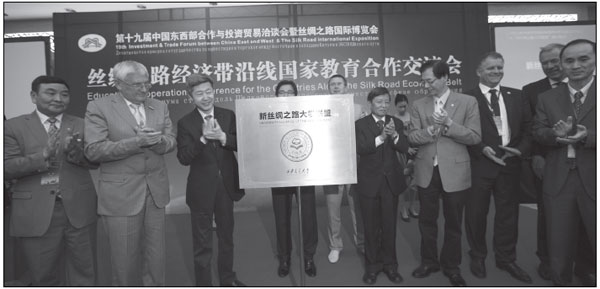Alliance unites higher education along Silk Road route
A higher education alliance was founded at the opening ceremony of a conference about education along the New Silk Road held in Xi'an, the capital of Shaanxi province.
About 200 participants, including delegates from both the Pakistani and British Embassies in China, as well as universities from 19 countries and regions, witnessed the foundation of the University Alliance of the New Silk Road.
Shaanxi, the starting point of the ancient Silk Road and an important hub in the Chinese section of the new Eurasian land bridge, has geographical advantages and rich educational resources to carry out education cooperation with countries along the route of the Silk Road Economic Belt, said Zhang Maizeng, Party chief of Xi'an Jiaotong University.
The province has 116 colleges and universities, educating about 1.5 million students.
These institutions have established relationships with counterparts in 50 countries and regions, and helped to set up 10 Confucius Institutes overseas.
Shaanxi is also home to more than 1,000 research institutes and 65 academicians.
Today's economic globalization and wider application of information and Internet technologies enable knowledge production and dissemination to break the limits of space and time, Zhang said.
Frequent flow of capital, technologies and human resources also requires the cross-department, cross-area and cross-border sharing of higher education resources, he added.
The alliance also issued a Xi'an Declaration the same day, stating it aims "to contribute to the common development of civilization and open collaboration in higher education", based on "the spirit of the Silk Road - peace and cooperation, openness and inclusiveness, mutual learning and mutual benefit". Establishment of the alliance was first proposed by Wang Shuguo, president of Xi'an Jiaotong University, at a related international forum in January. The initiative then gained support from nearly 100 universities from 22 countries and regions along the route, which have become members of the alliance.
They include The Hong Kong Polytechnic University, Moscow Power Engineering Institute, Al-Farabi Kazakh National University, University of Liverpool, National University of Singapore and Tampere University of Technology.
"Many are world-class universities and hope to have more communications with China in terms of cultural, science and human resources," Wang said.
Exchanges and collaborations among those universities will focus on joint research and development, cultural communication, policy study, personnel training, healthcare and medical services, he said.
Xi'an Jiaotong University has already signed cooperation agreements with many member universities to jointly host academic activities, increase their number of exchange students, share educational resources and establish joint labs. The university and Italy's Polytechnic University of Milan, for example, will jointly establish a school of design and an innovation center in China.
The alliance will be located in the West China Science and Technology Innovation Zone in Shaanxi's Xixian New Area.
The zone will be home to 23 research institutes and integrate 20,000 to 30,000 professionals across the world, Wang said. Last year, 60 experts and scholars were recruited for institutions within the zone.
Contact the writers at haonan@chinadaily.com.cn and luhongyan@chinadaily.com.cn
|
Participants witness the foundation of the University Alliance of the New Silk Road at an educational expo in Xi'an, Shaanxi province. |



















